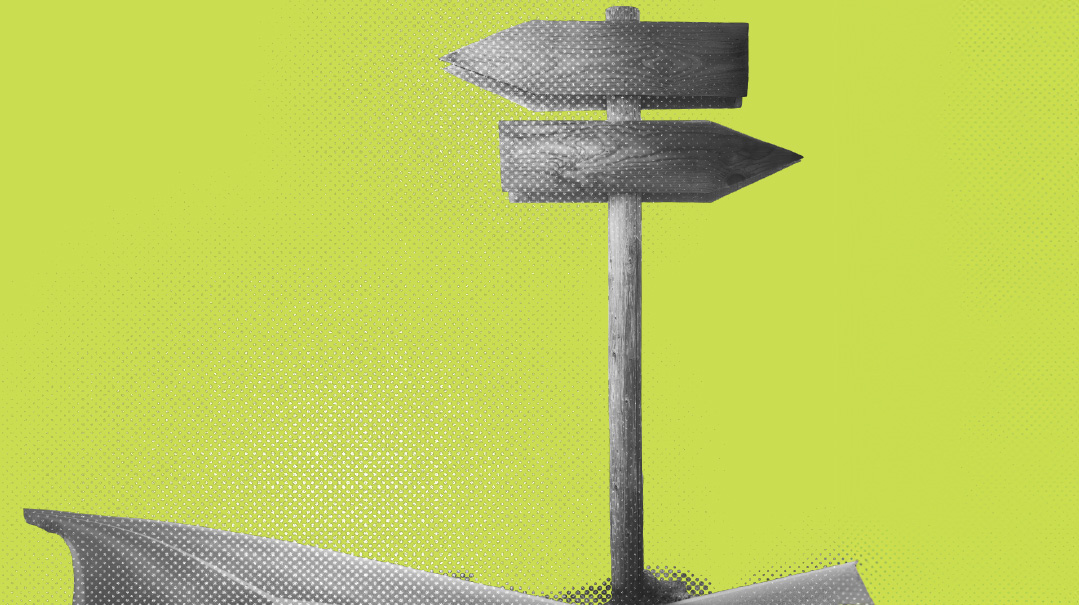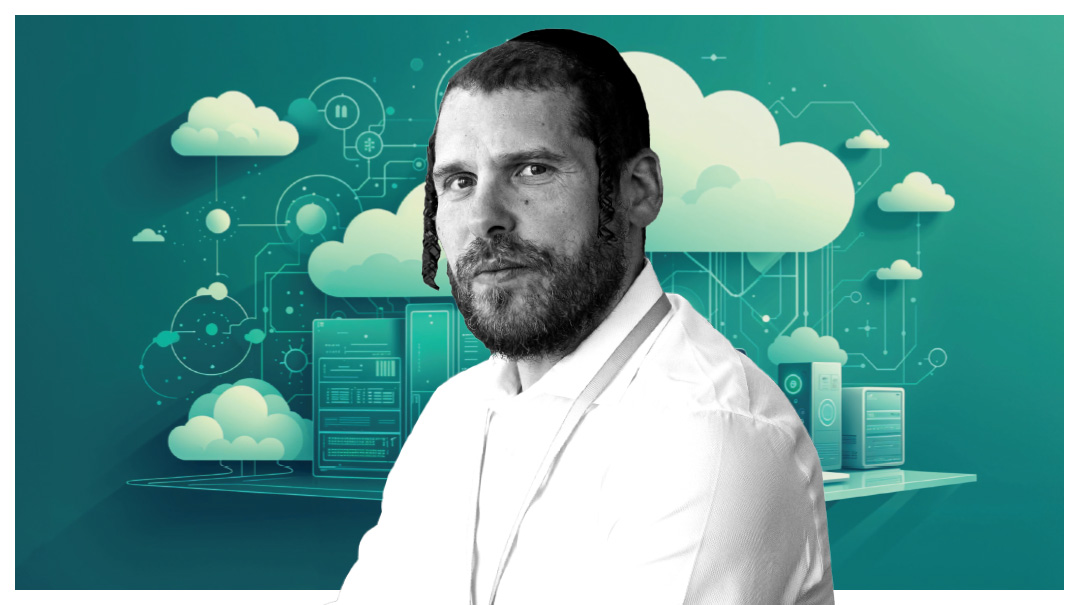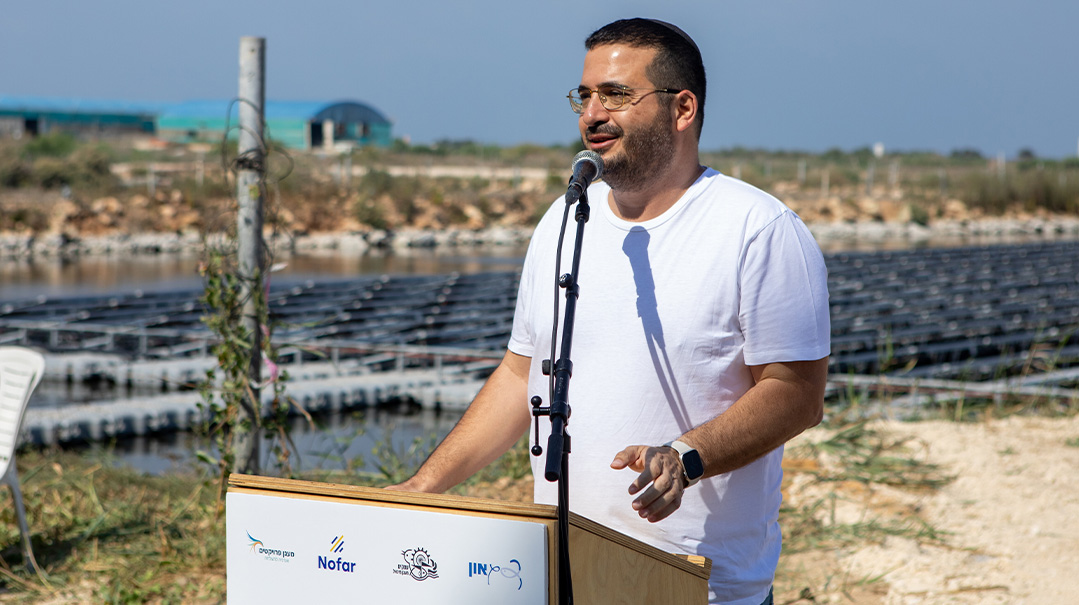Win-Win in Malta

Global entrepreneurs unite for a tech competition on an ancient island
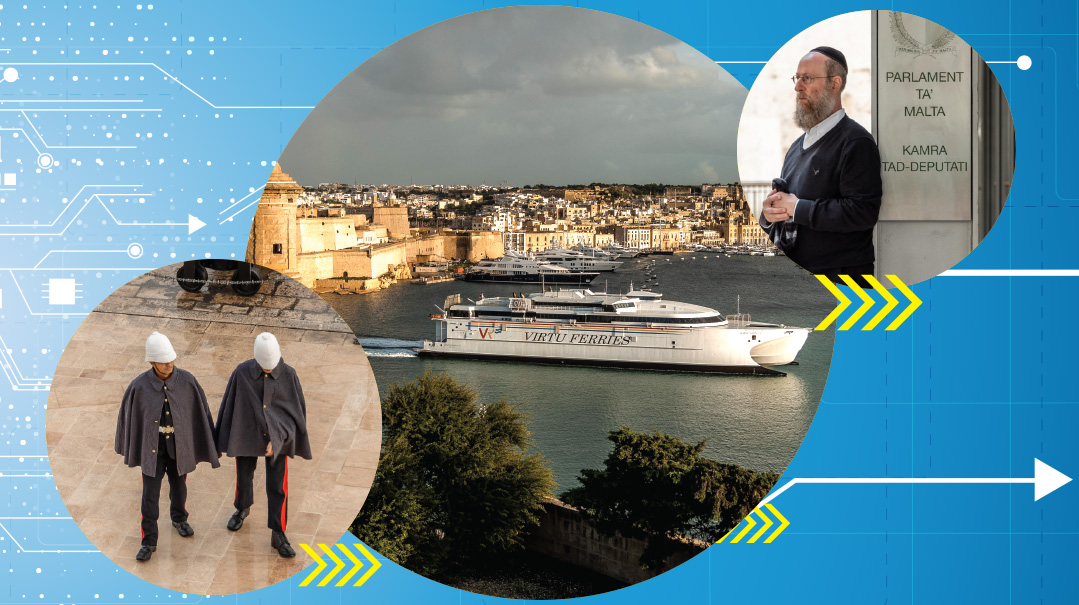
Photos: Eli Itkin
There is nothing glamorous about building a startup from the ground up.
Ask Veronica Celis Vergara, CEO of EnlightAID, who developed a platform that tracks charitable donations so donors can see where their money went.
Once, while seeking initial funding, she addressed a crowd of 200 potential investors in Norway and opened the floor to questions.
No one raised a hand.
“I thought we were doomed,” Veronica said. Eventually, a friend of her cofounder chipped in with $100,000 that started the ball rolling, but the process was tortuous. “I survived with sheer stubbornness, knocking on doors, going back home and crying, and then going back out again.”
Or ask Nina Patrick, founder of Memido, who produces at-home medical test kits for people seeking personalized health, nutrition, and fitness advice.
“It was incredibly challenging. I saw 700 investors in four years and only nine said yes,” Patrick recalls.
Both women were incredibly gratified last week when they captured the first prize of 26,000 euros for technology and innovation awarded by the Conference of European Rabbis (CER) in Malta. Funded by Russian-born venture capitalist Yuri Milner and his wife Julia, the CER has awarded more than 400,000 euros to entrepreneurs since its first awards conference in 2013 in Luxembourg. Perhaps the best-known winner to date was Eli Beer, founder of United Hatzalah, who won the second prize in the 2017 Helsinki competition for an app that locates the nearest volunteer medics and dispatches them to the scene of medical emergencies.
This year, the CER selected six prize winners, retroactive to 2020 and 2021 when the prize conference was canceled due to Covid-related travel restrictions. The contest was open to applicants from Europe and Israel. A four-judge panel, which included three European venture capitalists and CER President Rabbi Pinchas Goldschmidt, whittled down an initial list of 800 applicants before deciding on the six winners.
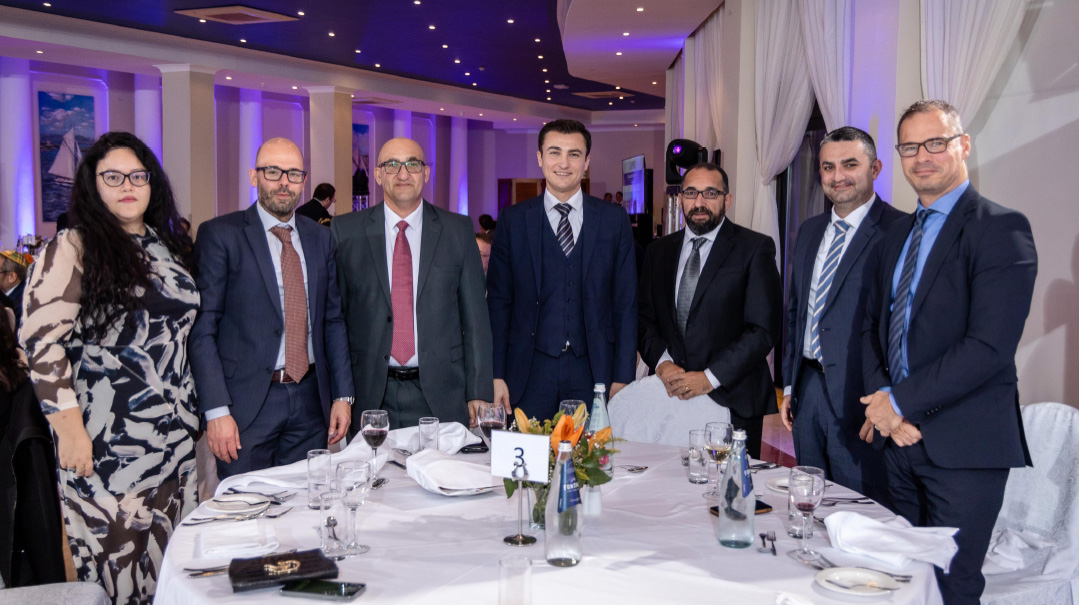
Silvio Schembri (fourth from right) Malta’s Minister of Economy says collaboration with Israel is important
In addition to the cash prize and the recognition that comes with it, Israel’s Ministry of Foreign Affairs extended invitations to the winners for a five-day visit to Israel to network with their peers in Israel’s “startup nation.” The government of Malta also announced it will reschedule a trade mission to Israel that was postponed due to the pandemic.
The Malta conference was cosponsored by MIMCOL, the Malta Investment Management Company Limited, whose role is to promote the island nation’s low-tax and business-friendly environment.
The CER is the umbrella organization for Europe’s chief rabbis and 900 community rabbis. Rabbi Goldschmidt contends there is no tension between providing spiritual assistance and engaging with new technologies and their innovators.
“Whenever technology or media changes, the world changes,” Rabbi Goldschmidt said, noting that the Internet conveys more information in one hour than the printing press once did in 100 years. “That’s changed the politics and the economies of the world. We need to see that this power is used to build the world, not to destroy it.”
New fields such as genetic engineering and even driverless cars can present the type of ethical dilemmas that our Sages addressed centuries ago. “It’s very important for us to make sure the future isn’t just better scientifically, but also morally and ethically,” Rabbi Goldschmidt said.
Many of the entrepreneurs have won prizes before, but this was the first time the benefactor was a Jewish organization with strong connections to Israel. “We’re very happy to receive this kind of recognition,” said David Sakic from Slovenia, whose company that screens for early signs of dementia took home one of the second prizes of 18,000 euros. “This can open doors for us in Israel which is one of the best places in the world for medical technology.”
Each of the prize winners has experiences to share that can be beneficial for fellow entrepreneurs, and all of their projects can help make a better world if they come to fruition. I spent time with all of them during the conference and the interviews were lightly edited for length and clarity.
Effi Baruch, CEO of Plethora Technologies, Third prize winner 2020
Based on software technology developed at the Weizmann Institute of Science, Plethora Technologies created an educational platform for students in grades four to seven to introduce them to computer science, enhancing their critical thinking skills and boosting their powers of logical reasoning.
He shared two examples of how the platform works.
“The typical fourth-grader learns the story of the tortoise and the hare,” Effi said. “They need to cross the river together. It takes the hare one hour and the tortoise two hours. The kids are asked how long the crossing will take. The answer, of course, is two hours, because they’re crossing together at the turtle’s pace, but most kids will answer three hours because they’re just adding one and two. We provide them with the tools to solve this problem correctly.”
The platform also helps students to think sequentially, using the example of the Israeli treat, the Crembo, which combines a cookie with a cream topping and chocolate coating.
“When you make a Crembo, you have to do it sequentially. You start with the cookie, then add the cream, and then put the chocolate on top. Once students understand the concept, they can practice making one themselves on our game platform,” Effi said.
During the Covid lockdowns, Plethora recorded remote lessons for the Ministry of Education, which made them available to every household in Israel. “We’re providing tools in computational thinking that can be used in other sciences, as well,” Effi said.
He estimates that some 300,000 schoolchildren, including some in Brazil, China, and South Korea, have accessed their platform, and the company will soon roll out a second program aimed at seventh to ninth graders.
Best Advice:
Strengthening skills like critical thinking, problem-solving and decision making is one of the most significant investments a society can make for its young people.
Simon Schwall, CEO of OKO Crop Insurance, Third prize winner 2021
Born in Luxembourg, Simon spent his formative years in France, earning a master’s degree in international management from HEC Paris, one of the world’s top-ranked business schools. After several years in management consulting in the telco industry, Simon launched micro-insurance services in Papua New Guinea, Fiji, and Egypt.
Today he lives in Akko with his wife Shira, who he met in Papua, when she was working in the country temporarily for an Israeli agritech company, and their very adorable son, who was both the center of attention and very well-behaved at every conference venue.
Simon’s experience with innovative mobile phone technologies and micro-insurance inspired his new startup, which provides crop insurance to farmers in Africa. “If there’s a drought or a flood, they receive compensation for the income they didn’t make. That helps them get through the next few months and prepare for the next growing season,” Simon said. So far, OKO has assisted 18,000 farmers who otherwise might have gone out of business, or even starved.
Since Israeli farmers have access to advanced technologies such as drip irrigation and greenhouses that protect them from drought and other adverse weather conditions, Israel is not a target market, but Simon is intrigued by the growth opportunities worldwide.
His goal is to insure 1 million African farmers by 2026, while expanding the business, mainly to South America, Southeast Asia, and the Pacific.
Best advice:
As an entrepreneur, change is an opportunity rather than a risk. Embrace change.
David Sakic, CEO of BrainTrip, Second prize winner 2020
David hails from Slovenia and his startup is incorporated in Malta. David isn’t Jewish, but he says his mother named him David because she was enthralled by the biblical story of King David, and he has a sister named Sarah.
David was working in the neuroscience department at the University of Ljubljana in the capital of Slovenia, where he and his cofounder were poring over the research of a Ph.D. student to see if a green tea extract could slow cognitive decline. David and his partner decided to use the electroencephalograph (EEG) to measure the effect of this extract on electrical activity in the brain.
They developed algorithms that led to their proprietary BrainTrip Dementia Index (BDI), an eight-minute test that can screen for signs of dementia even before symptoms emerge. The index ranks a patient’s current mental abilities on a scale of zero to 100. The lower the score, the higher the chance of dementia.
“If the score is below 40, we advise people to seek medical help as soon as possible, first with their GP and then by a neurologist,” Sakic said.
Sakic recently presented his findings at the Neuroscience 2022 conference in San Diego.
His first customers include four private psychiatric and diagnostic clinics in Slovenia, and he hopes to expand to the Netherlands and Malta. “Our test is not bound by language or culture,” Sakic said. “We use direct measurements of the brain and we can ship our solution anywhere.”
The company also hopes to develop tests to tackle other brain disorders that lack objective diagnostic tools, such as ADHD and depression.
Best Advice:
You’ll encounter unforeseeable hurdles that will make you want to give up. In those times, remember the mantra, “This, too, shall pass.”
Cornelius Palm, cofounder of Happyr Health, Second prize winner 2021
Cornelius hails from a small town in Germany close to the Dutch border. From the age of six, he suffered chronic abdominal pain which lasted until young adulthood and affected his quality of life.
He powered through, worked as a paramedic for five years, and studied entrepreneurship at Cambridge Judge Business School, before teaming up with Nicola Filzmoser of the UK, who has been suffering from migraine headaches from age four.
Cornelius and Nicola were working for an Austrian startup when they decided to do something more “purpose-driven” to help young people who suffer from chronic pain.
“There are three components to chronic pain; social, emotional, and biological,” Cornelius said. “Medical science is currently only treating the biological component, mostly with painkillers.” By treating the first two components, he hopes his platform will enable young people to gain the tools to build their resilience.
Based in Cambridge, UK, Happyr Health has active projects with the University of Stirling and the Leeds Teaching Hospitals. They have also collaborated with Dr. Mark Connelly, a leading professor of pediatrics and child pain management at Children’s Mercy in Kansas City.
The Happyr Health app provides short videos of self-management exercises, including breathing exercises, meditation, and muscle relaxation techniques. People can do one exercise a day for three consecutive days and then repeat, as necessary. They have simultaneously developed a course for parents that teaches them the skills to help their children cope with migraines.
Best Advice:
Entrepreneurship can be an extension of your personality and values.
Veronica Vergara, CEO EnlightAID, First prize winner 2020
We already headlined Veronica’s challenges at the outset, but there’s more to her story. Born in Chile, her startup is headquartered in Norway, and she lives in Germany.
An architect by training, her original dream was to build sustainable schools for children from vulnerable sectors in Chile. When she realized how daunting the fundraising could be in light of a UN report that as much as 30 percent of all charitable donations are lost to corruption, Veronica channeled her energies into creating an algorithm that tracks how donated funds are spent. Organizations who sign on with EnlightAID work through an authorized account where the money trail can be tracked and reports generated to the donors.
She says there is one good reason for a charitable organization to sign up, despite the additional scrutiny.
“To establish trust,” Veronica said.
EnlightAID has inked deals with a dozen charitable organizations and 300 individual donors. It’s now developing a second product to track publicly traded companies in the economic, social, and governance (ESG) sector, a fast-growing asset class, especially in socially conscious Europe. Their original algorithm, in concert with a second algorithm they are developing, checks if the companies are compliant with the requirements of an ESG company. The algorithms can also analyze if a company is meeting its diversity in hiring goals, and detect pay gaps between male and female employees.
“We hope that all this will allow us to continue to grow,” Veronica said.
Best advice:
Never give up, and find the strength to motivate yourself every single day.
Nina Patrick, CEO of Memido, First prize winner 2021
While studying for her Ph.D. in pharmaceutical sciences at the University of Arizona, Nina worked in the university’s technology transfer office evaluating intellectual property proposals. Nina was working for a Silicon Valley startup developing biosensors to detect fragrances and flavors. When the company got bought out, she decided to apply the techniques she learned there to the healthcare industry. She moved to Germany, which has an advanced system of startup accelerators, but soon discovered that female-led teams received only a minuscule percentage of the available venture capital. She persevered, and eventually raised $1.6 million.
Memido developed a testing kit so that users could perform a urinalysis at home that provides the same results that a laboratory test would, and more. Users scan a test strip that they upload to the Memido app, which analyzes the results in two minutes and sheds light on a patient’s nutrition, immunity, liver health, kidney health, and hydration.
“We’re trying to get our users to test weekly because the more measurements you take about yourself when you’re healthy, the earlier you can find out if anything is going wrong.”
Right now, their product is sold in Germany, mainly to women ages 25 to 35, who want to make sure they are achieving their fitness and health goals.
“We have some users who track their diet to see if they’re burning more fat than they are carbs, and so that’s an interesting test that our app will pick up,” Nina said.
Going forward, Nina is listening to user feedback to perfect the product, and eventually hopes to expand her reach by launching an R&D department to develop new products.
Best Advice:
Be patient with yourself as you try different strategies, adapt, and make changes.
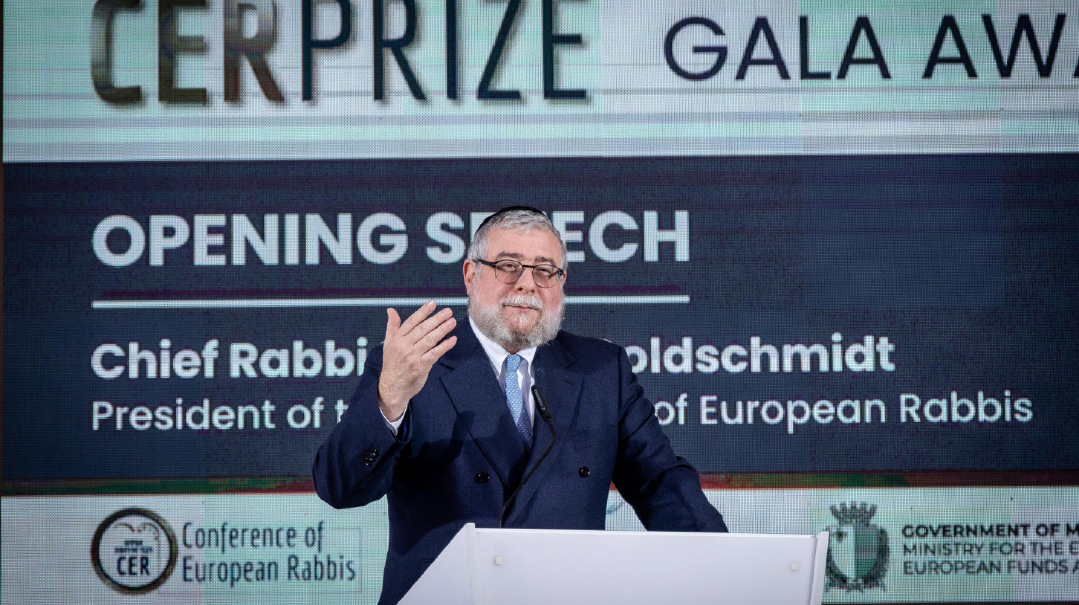
“It’s very important for us to make sure the future isn’t just better scientifically, but also morally and ethically” — Rabbi Pinchas Goldschmidt
MALTA: THE OLD AND THE NEW
Malta has a long and storied history, with six major world powers trading control over this island nation over the past 3,000 years. Christians, Muslims, and Jews resided there harmoniously in the Middle Ages, but that changed during the Spanish Inquisition when Jews were expelled. Once they returned, they faced similarly harsh conditions during the 268-year rule of the Knights of St. John.
Malta has a balmy, Mediterranean climate similar to Israel, but unfortunately, a blissful autumn turned blustery the day I arrived, with a mixture of intermittent rainfall and gusty winds. I did get the opportunity to say the blessing over the rainbow. While doing a standup interview outdoors, my kippah blew off and into the hotel swimming pool. At least it didn’t sink to the bottom. One of the prize winners chased it down and retrieved it for me, and all I could do was thank him before replacing the soaking-wet kippah, now scented with chlorine, back on my head.
Malta’s capital Valletta is a harbor town. Tall stone walls to hold back the sea surround narrow, winding roads with cobblestone streets that call for a pair of walking shoes with good traction.
It’s a mix of the old and the new. At least two barber shops I passed sported the familiar red, blue, and white barber’s pole that supposedly dates back to the Middle Ages when barbers doubled as bloodletters. Tourists still come to Malta to dive and look for shipwrecks. The main marina is filled with boats, many of which were butting bow and stern in the brisk winds.
There is a lookout point on the outskirts of town where you can see the tip of Sicily on a clear day, and sometimes, watch Mt. Etna erupt. Outside of the fairly crowded city, the landscape gives way to rolling green hills, sprinkled with pine trees and pastures for cow fodder.
The country’s main religion is Catholicism. Malta has one mosque in the south that was commissioned by Libya’s Muammar Qaddafi when he was still around.
The Jewish community built a new synagogue in 2000 to replace the one in Valletta that had fallen into disrepair. In 2013, Chabad opened a branch, from which it sponsors activities and Jewish education for the local community and provides essential services such as kosher food to tourists and the many Jews — mainly from Israel and France – who conduct business on the island.
The Security and Crisis Center, a program developed by the European Jewish Congress, has partnered with law-enforcement authorities in Malta. While widespread anti-Semitism is unknown, it’s an occasional factor, admits Israel Ohayon, vice-president of the Jewish community.
“You will always have anti-Semitism, especially when you have successful Jews,” said Ohayon, who hails from a prosperous family that manufactures luggage and custom-made textiles. “For a while, we saw swastikas spray-painted, not in Jewish locations, but in public areas,” Ohayon said. “I convinced police that they were an eyesore and unacceptable and they put a stop to it.”
After the revolt against Qaddafi broke out in Libya, and pro-Qaddafi demonstrations spilled over into the streets of Malta, Ohayon once again used his connections to keep the Jews secure.
“I wrote some articles, and appeared on local television here, and then the demonstrations stopped,” Ohayon said.
The government of Malta has a stable parliamentary democracy. The center-left Labor Party won 55 percent of the vote in the March 2022 election while the center-right Nationalist Party won close to 42 percent. Four fringe parties, including two from the far-right, shared 3 percent of the vote and hold no seats in parliament.
During the CER conference, many members of Malta’s business community spoke to promote the island’s pro-business climate, which includes an effective corporate tax rate of 5 percent, no capital gains tax, and the ability to establish immediate residency under its “digital nomads” program for those who work remotely.
Silvio Schembri, Malta’s Minister for the Economy told reporters at an impromptu news conference that aside from attracting new businesses to Malta, an overriding goal is to strengthen an “already very strong relationship” between Malta and Israel.
“I believe in economic diplomacy,” Schembri said. “There is a lot of room for collaboration between the two countries.”
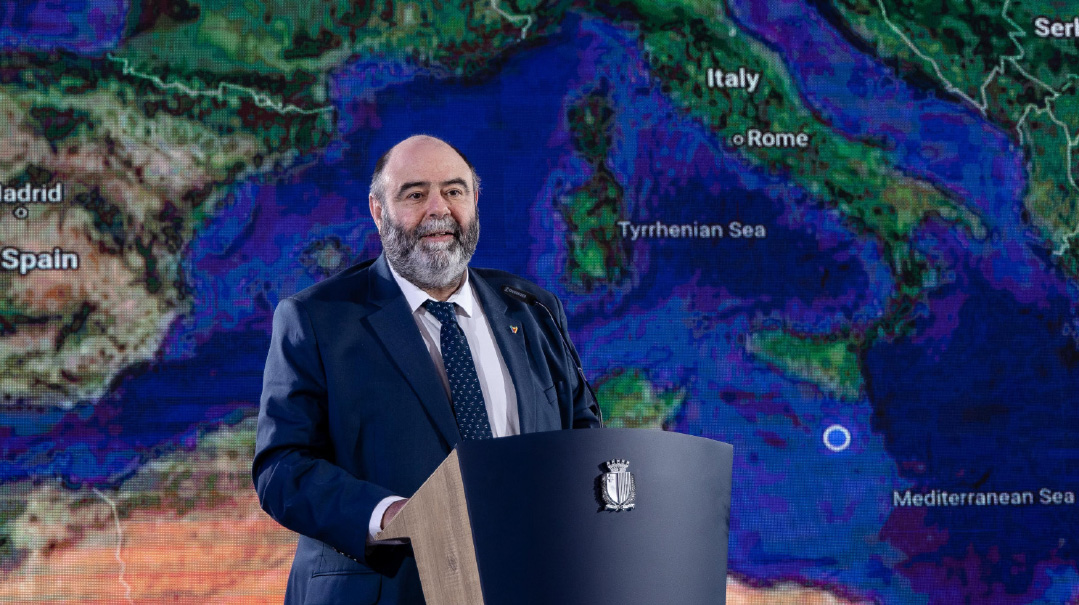
Leslie Vella, Deputy CEO Malta Tourism Authority is an expert on Jewish Malta
Location, Location, Location
Malta is a three-hour flight from Israel and is served by many major airlines. Strategically situated in the center of the Mediterranean Sea just south of Sicily, Malta is an archipelago of seven islands totaling 120 square miles; population of 520,000. Two main islands are fully inhabited, while a third — Comino — is inhabited by just two cousins.
At its peak, Malta might have been home to some 850 Jews. Some historians suggest members of the seafaring tribes of Zevulun and Asher may have established trade relations with their original Phoenician and Carthaginian citizens.
A menorah carved into the wall at the St. Paul Catacombs in Rabat indicates the site was once a 3rd- or 4th-century Jewish burial site.
Arabs ruled Malta from 870 CE to 1090 CE, wiping out Phoenician culture. During Arab rule, one Jew held the high-ranking title of Vizier.
The Norman Kingdom of Sicily conquered the Arab tribes in 1091 and for a little more than 400 years, the rulership was passed to a series of royal families from Germany, France, and Spain.
The earliest recorded Jewish presence in this era comes from a 1241 census listing 25 Jewish families, 681 Muslim families, and 1,047 Christian families. A militia list of able-bodied, men from 1419 to 1420 lists a couple of dozen Jewish names who were expected to provide coast guard duty if needed. The old Jewish quarter of Mdina still has a couple of signs from that era denoting a Jewish silk market and a Jew’s Gate.
About 40 years after the Inquisition, King Charles V of Spain granted control of Malta to the Order of the Knights of St. John, whose members included ruthless bands of pirates left over from the Crusades. The Knights turned Malta into a penal colony and would raid ships to seize hostages and hold them for ransom. “The monks would ‘hunt’ for Jews passing through on vessels because they knew they could ransom them for the highest prices,” says Reuben Ohayon, who was born in Malta and serves as president of Malta’s 60-member Jewish community, one-fourth of whom are his family members.
The Jewish cemetery in Kalkara is the burial ground of many of the Jewish slaves who didn’t survive the ordeal. Julius Nehorai, vice president of Malta’s Commonwealth Jewish Council, has raised money from a crowdfunding campaign to help restore the cemetery.
Malta remained the last bastion of the European slave trade until Napoleon captured it in 1798. Great Britain assumed control in 1814 until Malta won its independence in 1964. Malta served as an Allied naval stronghold throughout World War II and rescued thousands of Jews because it was the only European country that did not require Jews to have an entry visa.
Modern-day Malta is now a crime fighter instead of a crime haven. It’s an EU member, and although the neutrality clause in its constitution prevents it from joining NATO, Malta’s armed forces participate in peacekeeping missions and are active partners in combatting transnational crime in the Mediterranean. During the Arab Spring, Malta played a key role in supporting the evacuation of third-country nationals, including Americans from Libya, which is about 600 miles south.
Since the mid-1980s, Malta’s economy has boomed as a freight shipment point, a fintech center, and a tourist destination. Malta’s annual export-import trade with Israel has reached $380 million, and Malta and the United States have favorable trade relations and tax agreements.
While Malta’s synagogue sometimes struggles to get a minyan on Shabbos, it’s always open for prayers. Even before Chabad began providing for the kosher food needs of the community, the Ohayon family would bring in a shochet from Israel to make sure there was kosher meat.
When one of my media colleagues asked about the prospects of survival for the dwindling Jewish community, Israel Ohayon said it was not the first time he’s heard the question.
“They asked my grandfather that 90 years ago, and we’re still here.”
(Originally featured in Mishpacha, Issue 938)
Oops! We could not locate your form.

